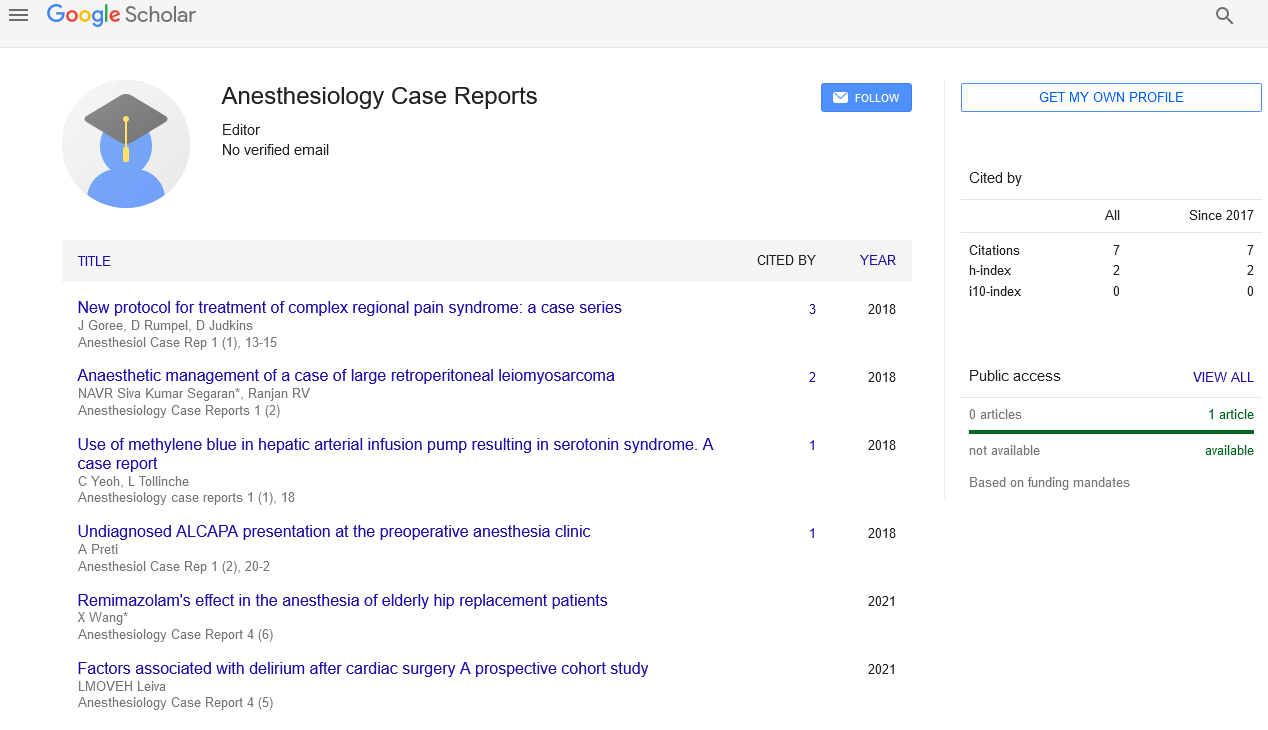Editorial note on anaesthesia treatment
Received: 04-Nov-2021 Accepted Date: Dec 18, 2021; Published: 25-Nov-2021
This open-access article is distributed under the terms of the Creative Commons Attribution Non-Commercial License (CC BY-NC) (http://creativecommons.org/licenses/by-nc/4.0/), which permits reuse, distribution and reproduction of the article, provided that the original work is properly cited and the reuse is restricted to noncommercial purposes. For commercial reuse, contact reprints@pulsus.com
Editorial Note
Anesthesia is a medical treatment that allows patients to be pain-free during surgery. It enables people to receive operations that allow them to live better and longer lives. Anesthetics are medications that doctors employ to cause anaesthesia. Scientists have created a variety of anaesthetic medicines with varying effects. General, regional, and local anaesthetics are among the medications in this category. During the surgery, general anaesthetics put patients to sleep. Local and regional anaesthetics only numb a portion of the body, allowing patients to remain awake throughout the surgery. If you are undergoing surgery, you will almost certainly be given some kind of anaesthetic to keep you from feeling pain. Local anaesthesia, which numbs a small area of the body where the surgery is being conducted, is the most secure type of anaesthesia. Pain or itching where the drug was injected is uncommon. While anaesthetic is extremely safe, it might have unexpected effects both during and after the treatment.
The anesthesiologist's original duty was to simplify surgical procedures by giving patients safe analgesia and amnesia. While this is still the major job of anesthesiologists, the scope of anaesthesia has expanded beyond being practised solely in the operating room to regions beyond the OR, as well as providing services as a consulting speciality in other fields. We understood very little about how anaesthetics worked until recently. All patients' safety is of the utmost importance when it comes to anaesthetic. Children account for one-quarter of the population, and many will require anaesthesia at some point during their lives. Most children undergoing surgery are fit and healthy, and in England and Wales, most elective surgeries and minor trauma anaesthesia are performed outside of a dedicated paediatric centre. However, there are numerous cases in which children require "specialized pediatric anaesthesia," such as neonates and babies, those undergoing difficult surgery, or those with considerable comorbidity. It is critical that wherever children are cared for, workers are sufficiently trained, appropriate equipment is available, and the child is in child-familyfriendly setting. Scientists may now investigate how particular chemicals within cells are affected by medications. The medications, according to the majority of researchers, target proteins in the membranes surrounding nerve cells. Anesthesiologists are increasingly considered actual perioperative physicians. Doctor anaesthetists are health professionals, much like your primary care doctor and surgeon. They specialise in anaesthetic treatment, pain management, and critical care medicine, and have the knowledge to understand and treat the full human body. They also assist patients suffering from severe pain as a result of an injury, as well as those suffering from chronic or recurring pain, such as migraines or ongoing back problems.
Scientists are learning more about the fundamentals of anaesthetics. They are also investigating the short and long-term impacts of these medications on certain populations, such as the elderly and cancer survivors. This research will determine whether certain anaesthetics are superior to others for those groups' members. The study of how a person's genetic constitution determines how he or she responds to anaesthetics will allow doctors to customize drugs to each patient's individual needs. Scientists want to develop safer, more effective, and tailored anaesthetics in the future. Understanding how anaesthetics affect pain and awareness may lead to new treatments for disorders affecting consciousness, such as epilepsy or coma. Anesthesia research may potentially help us better grasp the nature of consciousness.





